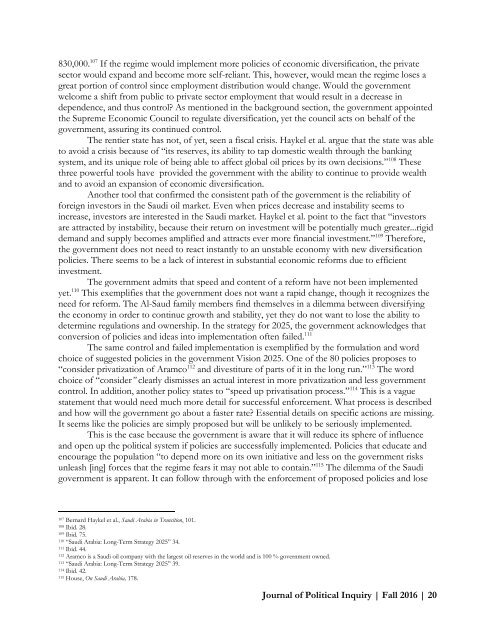Fall2016_Final2
Create successful ePaper yourself
Turn your PDF publications into a flip-book with our unique Google optimized e-Paper software.
830,000. 107 If the regime would implement more policies of economic diversification, the private<br />
sector would expand and become more self-reliant. This, however, would mean the regime loses a<br />
great portion of control since employment distribution would change. Would the government<br />
welcome a shift from public to private sector employment that would result in a decrease in<br />
dependence, and thus control? As mentioned in the background section, the government appointed<br />
the Supreme Economic Council to regulate diversification, yet the council acts on behalf of the<br />
government, assuring its continued control.<br />
The rentier state has not, of yet, seen a fiscal crisis. Haykel et al. argue that the state was able<br />
to avoid a crisis because of “its reserves, its ability to tap domestic wealth through the banking<br />
system, and its unique role of being able to affect global oil prices by its own decisions.” 108 These<br />
three powerful tools have provided the government with the ability to continue to provide wealth<br />
and to avoid an expansion of economic diversification.<br />
Another tool that confirmed the consistent path of the government is the reliability of<br />
foreign investors in the Saudi oil market. Even when prices decrease and instability seems to<br />
increase, investors are interested in the Saudi market. Haykel et al. point to the fact that “investors<br />
are attracted by instability, because their return on investment will be potentially much greater...rigid<br />
demand and supply becomes amplified and attracts ever more financial investment.” 109 Therefore,<br />
the government does not need to react instantly to an unstable economy with new diversification<br />
policies. There seems to be a lack of interest in substantial economic reforms due to efficient<br />
investment.<br />
The government admits that speed and content of a reform have not been implemented<br />
yet. 110 This exemplifies that the government does not want a rapid change, though it recognizes the<br />
need for reform. The Al-Saud family members find themselves in a dilemma between diversifying<br />
the economy in order to continue growth and stability, yet they do not want to lose the ability to<br />
determine regulations and ownership. In the strategy for 2025, the government acknowledges that<br />
conversion of policies and ideas into implementation often failed. 111<br />
The same control and failed implementation is exemplified by the formulation and word<br />
choice of suggested policies in the government Vision 2025. One of the 80 policies proposes to<br />
“consider privatization of Aramco 112 and divestiture of parts of it in the long run.” 113 The word<br />
choice of “consider” clearly dismisses an actual interest in more privatization and less government<br />
control. In addition, another policy states to “speed up privatisation process.” 114 This is a vague<br />
statement that would need much more detail for successful enforcement. What process is described<br />
and how will the government go about a faster rate? Essential details on specific actions are missing.<br />
It seems like the policies are simply proposed but will be unlikely to be seriously implemented.<br />
This is the case because the government is aware that it will reduce its sphere of influence<br />
and open up the political system if policies are successfully implemented. Policies that educate and<br />
encourage the population “to depend more on its own initiative and less on the government risks<br />
unleash [ing] forces that the regime fears it may not able to contain.” 115 The dilemma of the Saudi<br />
government is apparent. It can follow through with the enforcement of proposed policies and lose<br />
107<br />
Bernard Haykel et al., Saudi Arabia in Transition, 101.<br />
108<br />
Ibid. 28.<br />
109<br />
Ibid. 75.<br />
110<br />
“Saudi Arabia: Long-Term Strategy 2025” 34.<br />
111<br />
Ibid. 44.<br />
112<br />
Aramco is a Saudi oil company with the largest oil reserves in the world and is 100 % government owned.<br />
113<br />
“Saudi Arabia: Long-Term Strategy 2025” 39.<br />
114<br />
Ibid. 42.<br />
115<br />
House, On Saudi Arabia, 178.<br />
Journal of Political Inquiry | Fall 2016 | 20
















